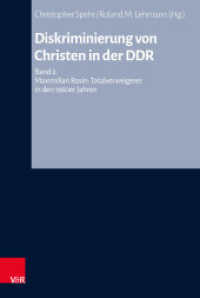Full Description
Reveals the surprising historical roots of US immigration policy and discourse.
Unfortunately, we're all too familiar with the US's legacy of maligning immigrants. Some Americans see immigrants as inherently threatening, a blank screen onto which the nation's worst fears are projected. But this phenomenon is neither timeless nor static. Instead, it arose and transformed alongside the unprecedented arrival of immigrants in the early twentieth century—and the federal government's response. In The Unruly Facts of Race, sociologist Sunmin Kim explains how American ideas about race and ethnicity were transformed in the early twentieth century as an unintended consequence of anti-immigrant mobilization.
Kim presents a wealth of archival evidence, including the proceedings of the 1907 Dillingham Commission, to reconstruct how competing racialized visions of nationhood evolved in the early twentieth-century immigration debate. Immigration restrictionist politicians believed that the United States should be a White, Anglo-Saxon, and Protestant nation. However, when they mobilized researchers—some of whom were women and/or immigrants—to gather data at a massive scale to rationalize their aims, they were met with unruly facts that did not support their racial project. Newer European immigrants, as the data showed, were not much different from descendants of earlier immigrants from northern Europe. When facts failed to support the vilification of immigrants, exclusionist politicians instead turned to race as a marker of ineluctable difference to justify their aims. This led to a new principle of national belonging: the United States transitioned to a country that encompassed various European groups, including Catholics and Jews, but excluded non-White immigrants, as they were deemed too different to become a part of the nation.
Kim's analysis shows that throughout US history, the opportunity for belonging for some immigrants was predicated on the exclusion of others. His focus on the role of facts in the early twentieth century provides a refreshing take on why the so-called "nation of immigrants" has always demonized some immigrants while cherishing others, highlighting the selection and control of immigrants as the core principles of the American nation-building project. Amid a vitriolic explosion of American immigration discourse, Kim offers a needed corrective to and context for debates around who belongs in the United States.
Contents
Introduction: Race, Legitimacy, and Facts
1. The History of Race-Thinking
2. The Strange Bedfellows of the Immigration Debate
3. Ethnicity: A New Kind of Difference
4. Assimilation: Dissolving Difference
5. Reinterpreting the Facts: Women and Immigrants Talk Back
6. Japanese Immigrants and Insurmountable Difference
7. The Strange Career of National Quotas
Conclusion: The Limits of Racial Liberalism
Acknowledgments
Appendix: The Titles of the Dillingham Commission Reports
Notes
Bibliography
Index







